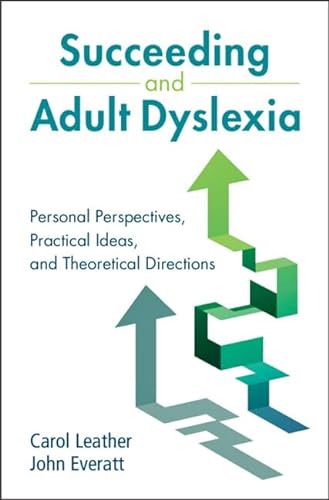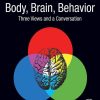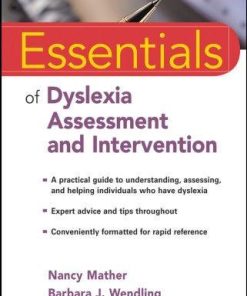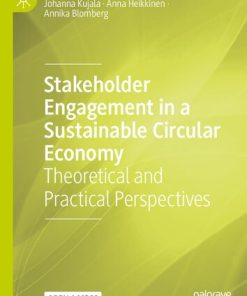(EBook PDF) Succeeding and Adult Dyslexia Personal Perspectives Practical Ideas and Theoretical Directions 1st edition by Carol Leather, John Everatt 110895703X 9781108957038 full chapters
$50.00 Original price was: $50.00.$25.00Current price is: $25.00.
Succeeding and Adult Dyslexia: Personal Perspectives, Practical Ideas, and Theoretical Directions 1st edition by Carol Leather, John Everatt – Ebook PDF Instant Download/DeliveryISBN: 110895703X, 9781108957038
Full download Succeeding and Adult Dyslexia: Personal Perspectives, Practical Ideas, and Theoretical Directions 1st edition after payment.

Product details:
ISBN-10 : 110895703X
ISBN-13 : 9781108957038
Author: Carol Leather, John Everatt
There is a need to demonstrate the potential that dyslexic adults have to achieve success despite the difficulties often associated with dyslexia. A focus on adults with dyslexia is pertinent given that individual life experiences have the potential to make dyslexia in adulthood more variable in manifestation than in childhood. This book offers a comprehensive discussion of the relationship between dyslexia and success based on current understanding derived from theory and practice, including the challenges of dyslexia in work-related contexts and a range of potential solutions. It presents a framework to conceptualise adult dyslexia and these individual difficulties and provides a basis for success. Personal stories of adult dyslexics who have faced work-related challenges are included alongside a set of strategy-based solutions for dealing with and responding to such challenges. This is an essential resource for dyslexic adults themselves, plus coaches, HR departments, and managers in organisations and training institutions.
Succeeding and Adult Dyslexia: Personal Perspectives, Practical Ideas, and Theoretical Directions 1st Table of contents:
Part I
1 Introduction
1.1 Dyslexia over the Lifespan
1.1.1 Elements 1 and 2: Reading and Writing Issues
1.1.2 Element 3: Specificity, Comorbidity, and Neurodiversity
1.1.3 Element 4: Causes and Consequences of Dyslexia
1.2 Book Aims, Focus, and Methods
2 Adult Dyslexia
2.1 Introduction
2.2 Framework of Adult Dyslexia
2.3 Assessment of Adults with Dyslexia
2.3.1 Reading and Writing Skills
2.3.2 Educational History or the Background to Learning
2.3.3 Cognitive-Linguistic Factors
2.3.4 Additional Areas of Assessment
2.4 Overall Profile
2.5 Conclusion
3 Theoretical Perspectives on Success
3.1 Introduction
3.2 Career Success
3.3 Personal Perspectives of Career Success
3.4 Self-efficacy
3.5 Goal-Setting
3.6 Planning
3.7 Executive Functions, Working Memory, and Metacognition
3.8 Metacognition
3.8.1 Metacognition and Dyslexia
3.9 Metacognition and the Development of Expertise
3.10 Dyslexia and the Importance of Developing Expertise
3.11 Dyslexia and Success
Part II
4 Strategies Contributing to Success
Overview
4.1 Introduction
4.2 Personal Contributions
4.3 Strategy 1: Understand Yourself and Your Dyslexia
4.3.1 The Assessment Process
4.3.2 Responses to the Diagnosis
4.3.3 Explaining What the Assessment Means
4.3.4 Strengths and Weaknesses
4.3.5 Reframing the Challenges
4.3.6 Explaining the Challenges
4.3.7 Memory and Information Processing
4.3.8 Strategies to Alleviate Information Processing Difficulties
4.4 Strategy 2: Be Strategic in Order to Mitigate the Difficulties, and Use Your Metacognitive/Executive Processes
4.5 Strategy 3: Never Underestimate Your Memory
4.6 Strategy 4: Make the Most of Your Time
4.6.1 Time Estimation
4.6.2 Organisation
4.7 Strategy 5: Maximise Your Motivation
4.7.1 Self-efficacy
4.7.2 Ways to Increase Self-efficacy and Motivation
4.7.3 Cognitive Strategies
4.7.4 Practical Strategies
4.8 Strategy 6: Social Ecologies and Seeking Support from Others
4.8.1 Cautionary Note on Social Ecologies
4.9 Strategy 7: Promoting Yourself Positively and Informative Disclosure
5 Literacy and Language Issues and Strategies
Overview
5.1 Introduction
5.2 Literacy and Language Issues and Strategies
5.3 Reading and Spelling
5.4 Activities/Strategies to Consider and Try
5.4.1 Phonological Activities to Improve Phonological Awareness at Any Age
5.4.2 Phonological/Orthographic Activities
5.4.3 Morphology/Orthography Activities
5.4.4 Word Origins (Morphology/Orthography)
5.4.5 Semantic/Word Knowledge Games
5.5 Second-Language Learning and Dyslexia
5.6 Text-Reading Strategies
5.7 Reading Comprehension Processes and Strategies
5.8 Technology Supports
6 Effective Communication
Overview
6.1 Introduction
6.2 The 4 Ms Principles
6.2.1 Make It Manageable
6.2.2 Make It Meaningful
6.2.3 Make It Multisensory
6.2.4 Memory Aids
6.3 Reading at Work
6.4 Writing at Work
6.5 Making and Taking Notes
6.6 Listening and Speaking at Work
6.7 Lectures, Conferences, and Talks
6.8 Presentations and Interviews
7 Dyslexia in the Workplace
7.1 Introduction
7.2 Dealing with Work-Specific Challenges
7.2.1 Time Management
7.2.2 Prioritisation
7.2.3 Multitasking
7.2.4 Work Overload
7.2.5 Organisation at Work
7.2.6 Memory Challenges
7.2.7 The Environment
7.2.8 Managing Stress and Poor Performance
7.3 Dealing with Novelty and Change
7.3.1 Promotion
7.4 Workplace Training and Professional Examinations
7.4.1 Professional Examinations
7.4.2 Developing Job-Specific Expertise: Goodness of Fit and Finding Your Niche
8 Organisational Influences on Success
Overview
8.1 Introduction
8.2 The Workplace Ecosystem
8.3 Managing Dyslexia and the Role of the Manager
8.4 A Personal Work Passport
8.5 Constructive Feedback
8.6 Seeking Advice from Others
8.7 Coaching and Mentoring
8.8 Support Groups
8.9 Compensatory Resources, Strategies, and IT Skills
8.10 Practical Strategies
8.11 The Environment
8.12 Assistive Technology
8.13 Reasonable Adjustments
8.14 Extra Time
8.15 Recruitment and Selection
8.16 The Workplace
8.17 The Employer’s Responsibilities
8.18 Awareness, Assessment, and Implementation
9 Personal Perspectives of Dyslexia and Career Success
9.1 Introduction
9.2 Conclusion
10 Summary and Conclusions
People also search for Succeeding and Adult Dyslexia: Personal Perspectives, Practical Ideas, and Theoretical Directions 1st:
successful adults with dyslexia
dyslexia and success
succeeding with adult adhd
dyslexia success academy
succeeding with dyslexia
Tags:
Succeeding,Adult Dyslexia,Personal Perspectives,Practical Ideas,Theoretical Directions
You may also like…
Uncategorized
Perspectives on International Relations: Power, Institutions, and Ideas 6th Edition, (Ebook PDF)
Politics
Pluralism and World Order: Theoretical Perspectives and Policy Challenges Feng Zhang 2023rd Edition
Politics & Philosophy - Anthropology
Business & Economics - Management & Leadership
dictionaries & phrasebooks
Politics & Philosophy
Politics & Philosophy - Others











